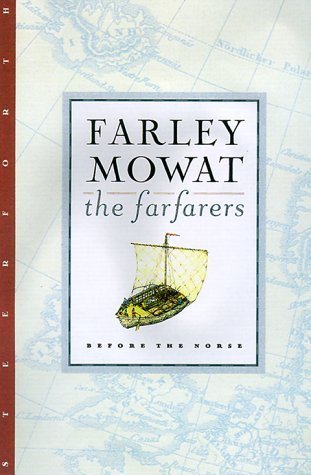
Mysterious Longhouses in the Arctic, ancient stone beacons in Newfoundland—are they evidence of Europeans who crossed the Atlantic before A.D. 1000? Farley Mowat advances a controversial new theory about the first visitors to North America. Mowat's Westviking: The Ancient Norse in Greenland and North America (1965) was highly influential in helping to establish the belief, now commonly held, that the Norse visited North America some 500 years before Columbus. And yet "a worm of unease" plagued Mowat even then, a vague feeling that he hadn't gotten it quite right. He spent the next 30 years in search of a theory that would explain inconsistencies in the archaeological evidence (such as carbon-dated ruins not left by the Inuit, but that predated the arrival of Vikings in Newfoundland by hundreds of years). Now in The Farfarers he asserts that another Indo-European people he calls the "Alban" preceded the Norse by several centuries. Throughout The Farfarers, Mowat skillfully weaves fictional vignettes of Alban life into his thoughtful reconstruction of a forgotten history. What emerges is a bold and dramatic panorama of a harsher age: an age of death-dealing warships and scanty food supply, of long, cold journeys across the night sea into unknown lands. "A spellbinding story . . . told by a master storyteller at the top of his form." —The Globe and Mail "The book is a fascinating glimpse of yesteryear and offers brief histories on the Celts, Saxons, Vikings, Inuits, and other peoples of the northern hemisphere. Written in vigorous, picturesque prose." —The Edmonton Sun
Author

Farley McGill Mowat was a conservationist and one of Canada's most widely-read authors. Many of his most popular works have been memoirs of his childhood, his war service, and his work as a naturalist. His works have been translated into 52 languages and he has sold more than 14 million books. Mowat studied biology at the University of Toronto. During a field trip to the Arctic, Mowat became outraged at the plight of the Ihalmiut, a Caribou Inuit band, which he attributed to misunderstanding by whites. His outrage led him to publish his first novel, People of the Deer (1952). This book made Mowat into a literary celebrity and was largely responsible for the shift in the Canadian government's Inuit policy: the government began shipping meat and dry goods to a people they previously denied existed. The Sea Shepherd Conservation Society ship RV Farley Mowat was named in honour of him, and he frequently visited it to assist its mission.